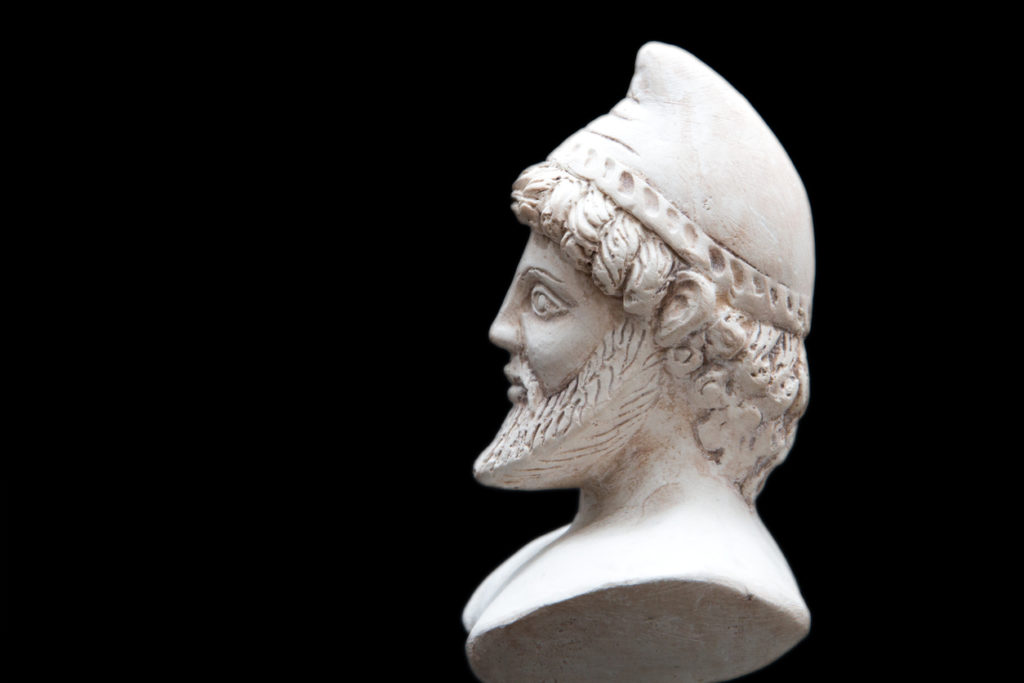Ah, wily Odysseus. After battling the Trojans for ten years, all he wanted to do was go home to his wife. Too bad he blinded Poseidon’s son to save his men from being eaten by that same son. Because of that insult, it took him an additional ten years to get home.
He did get home, though. That’s Fortitude in action. So, is Fortitude only something for the ancients, or can we cultivate it today? That’s the topic we’re going to explore.

Before moving on to how to cultivate Fortitude, let’s take a brief overview of Odysseus’s wanderings and the obstacles he had to overcome: he and his men are tempted by the Lotus-Eaters to give up their quest and become Lotus-Eaters themselves; a Cyclops (the above-mentioned son of Poseidon) wants to eat him and his men for dinner (indeed, he eats two of Odysseus’s men right away); a bag of winds obtained from Aeolus (god of the winds) blows Odysseus and his men off course; his men are killed by cannibalistic giants; the goddess Circe turns a scouting party of Odysseus’s men into swine; Odysseus is tempted to give up his quest to return home by the song of the Sirens; he must fight his own instincts and willingly sacrifice six of his men to pass the deadly six-headed monster Scylla; the gods turn against him and his crew due to their eating the cattle of the Sun god; and, finally, he is captured by the sea nymph Calypso and held prisoner by her for seven years.
Whew. Odysseus faced a host of obstacles, yet was able to finally return home. In order to do so, though, he not only had to have strength (both physical and emotional), he also had to have courage. In other words, he needed Fortitude.
Fortitude, then, is having the courage and strength to persevere even in the face of seemingly overwhelming obstacles. In a moral sense, Fortitude is having the strength and courage to stand up for what one considers to be right and good.
Let’s see what we need in order to be able to act with Fortitude.
The Ability to Feel the Fear and Move Through It
The situations that we find ourselves in where Fortitude comes into play are often those in which we also encounter a lot of fear. If we try to just push away the fear, though, it often arises again even stronger than before we tried to push it away.
Part of Fortitude is feeling the fear without letting it either turn us reckless or cowardly. Fear is a natural and appropriate response to many situations. Just because it is natural, though, does not mean we should act from it.
Instead, we need to look at the goal we have. If the goal is right and good (for us or for others that we are trying to help), then we need to be able to accomplish it. If fear is trying to stop us from doing so, we need to deal with it and move forward.
Think of Odysseus tied to the mast to resist the call of the Sirens. Every part of him wanted to heed their call, but he knew if he did he would never see Ithaca again. So, he had his crew restrain him and put wax in their ears; by doing so he was able to move forward with his goal, despite the temptation to do otherwise.
The Ability to Persevere
Do you think Odysseus was tempted to give up on seeing his wife and son again? Of course he was, especially when he was imprisoned by Calypso. Yet while he occasionally paused, he never gave up on getting home.
In the pursuit of any worthy goal, there are likely to be setbacks. In fact, the more worthy the goal, the more setbacks there are likely to be!
If we give up on our goal because of the setbacks we face, we are acting with pusillanimity rather than with the strength that Fortitude requires of us. In other words, we have given into cowardice rather than tapped into our strength.
To combat this tendency, we need to cultivate the habit of perseverance. Instead of seeing a setback in your goal as a wall to stop you, recast the event in a more positive light. Instead of seeing a setback or obstacle, look at the challenges that arise as opportunities to learn. Why did this happen? Now that it has happened, how can I constructively address it?
Use the answers to these questions to fuel your forward progress.
Patience
Society conditions us to want things NOW. Instant gratification is often too slow for us.
In order to practice Fortitude, however, we need to cultivate patience. Things may not be exactly as we would like them in this instant. As long as we are making progress, though, we need to keep putting one foot in front of the other.
Progress may not always be easy — or linear. We may have to struggle with something for longer than we would like, or put up with less than ideal situations. As we move forward, we may find that there are times that we appear to be falling into old habits that are delaying our progress.
All of the above is fine, as long as we do not lose the willingness to move forward. In order to fulfill often audacious goals, we should expect to have to go through a process. Anyone who promises an easy road to an audacious goal is either a fool or a liar.
Patience is often hard, especially if we are experiencing any type of pain while we are waiting for something to happen. Nevertheless, we have to realize that pursuing a goal is a step-by-step process and be willing to endure whatever is required in order to fulfill our goal.
Don’t give up!
As we seek the goals for our lives that we feel to be good, there are likely to be setbacks. Fortitude is the virtue that keeps us pursuing our goals when things get tough. In order to cultivate Fortitude, we need to be able to move through our fear, persevere and employ patience, especially when things seem to be not going our way in the current moment.
If we employ the above strategies, we can achieve anything we desire. And that’s a great thing!


